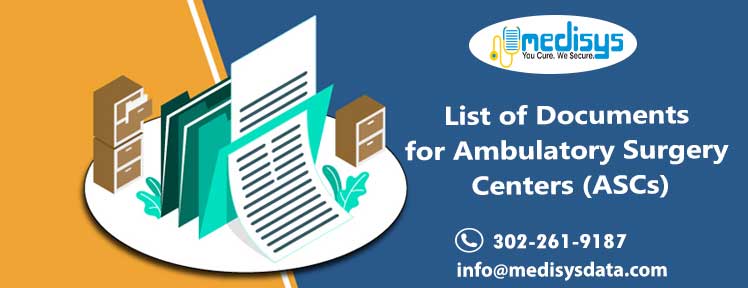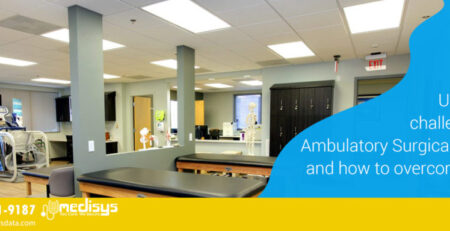Billing for Ambulatory Surgery Centers (ASCs) is tightly regulated by numerous federal as well as state-level regulatory authorities. Complete documentation will support all procedure codes your billed and will provide complete picture for payers. In this article, we shared list of required documents for ambulatory surgery centers who are beneficiaries of Medicare. Comprehensive documentation requirements for ambulatory surgical services include:
- History and physical examination documentation
- Pre-operative medical record documentation
- Anesthesia documentation
- Intra-operative medical record documentation
- Post-operative medical record documentation
- Discharge documentation
List of Documents for Ambulatory Surgery Centers
History and Physical Examination
The medical record must include a history and physical examination documentation including significant medical history and results of the physical examination. The history and physical examination to be completed no more than 30 days prior to the date of surgery. Ambulatory surgery centers may accept history and physical documents from other practitioners or organizations if the results of the history and physical are confirmed by the practitioner who is accepting responsibility for the patient’s care and the practitioner documents or confirms the conclusions or impressions that were drawn from the history and physical. Any significant changes in the patient’s condition subsequent to these assessments are to be documented. The record should always document the physician’s examination of the patient, performed immediately prior to surgery.
Pre-operative Medical Record
Pre-operative medical record should contain various elements in the pre-operative record including:
- Date of admission and discharge
- Names of referring and attending physicians
- The pre-operative diagnosis
- Data to support the diagnosis and planned treatment
- Reports of any pre-operative diagnostic studies or consultations Diagnostic or therapeutic orders which must be dated and signed
- Documentation of allergies (if the patient has no history of allergies or adverse reactions, this should be noted in a prominent place)
- Informed consent
- Documentation of vital signs, assessments, and other findings
- Any evidence of advance directives
- Nurses’ notes
- Laboratory, EKG, and x-rays that are necessary and relevant to the patient’s health status and for the procedure being performed or completed and reports available at the time of surgery.
Anesthesia Documentation
Anesthesia documentation includes a pre-anesthesia evaluation by an individual qualified to administer anesthesia immediately before surgery to evaluate the risk of anesthesia and of the procedure to be performed. In addition, this pre-anesthesia evaluation should consider data from other assessments and collect information needed to complete selection and planning of anesthesia, safely administer anesthesia, and interpret findings of patient monitoring. The medical record should also include all the entries reflecting the monitoring of the patient’s physiological status during the operative procedure.
Intra and Post-operative Documentation
Medical records should contain appropriate documentation with the following:
- An operative note describing the techniques, findings, and any tissues removed or altered during the procedure.
- The names of the clinicians involved, the post-operative diagnosis, and the condition of the patient at the end of the procedure.
- Documentation of any and all complications and evidence of the management of post-operative complications or unusual events.
- The operative note must be written or dictated immediately following surgery, and must be signed by the surgeon. However, when the operative report is not placed in the medical record immediately after surgery, a progress note should be entered.
- The record must contain a tissue diagnosis by a pathologist on any tissues removed during surgery excluding those exempted by the governing body.
- Documentation of the patient’s vital signs, level of consciousness, and medications, including IV fluids.
- Post-operative orders for drugs and biologicals.
- A report of any adverse reactions to drugs or biologicals to the physician.
- Documentation of physician’s evaluation of the patient to assess for proper anesthesia recovery prior to discharge.
- Assessment on admission to and discharge from the post anesthesia recovery area.
- Documentation of discharge from post-anesthesia care area by the responsible independent practitioner or according to discharge criteria.
- Documentation of compliance with discharge criteria Condition of the patient on discharge.
- Documentation of the name of the licensed independent practitioner responsible for the discharge.
- Discharge diagnosis.
- A nursing note documenting post-operative abnormalities or complications, vital signs, and general condition of the patient
Discharge Documentation
- The medical records should document discharge plans (e.g., plans to discharge to home with the care of the family or if there is no family, adequate plans for home care).
- A description or copy of actual patient instructions and/or education should be included in the patient’s medical record.
- A discharge summary which includes the condition of the patient and any post-operative instructions to the patient should be completed at the time of discharge.
Ambulatory Surgery Centers (ASC) documentation or overall ASC billing can be overwhelming. Billing team who might have incomplete knowledge in this field are prone to make errors resulting in claim denials and delays in reimbursements. Medisys Data Solutions is a leading medical billing company providing complete billing services for ambulatory surgery centers. To know more about our billing and coding services, contact us info@medisysdata.com/ 302-261-9187
Reference: https://www.painphysicianjournal.com/2009/july/2009;12;E199-E224.pdf












